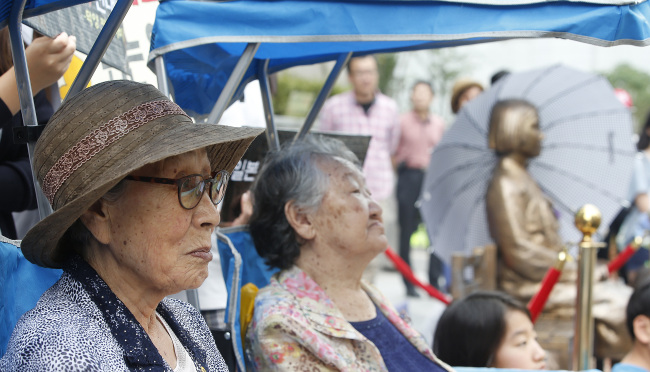Aging Korean victims of Japan’s wartime sex slavery have decided to file a lawsuit against Tokyo to seek financial compensation after the Japanese government refused to attend all mediation sessions at a Seoul court over the last two years, the women’s lawyer said Thursday.
A total of 12 Korean victims in 2013 filed a mediation request to the Seoul Central District Court, asking Tokyo to pay 100 million won ($86,000) to each woman to compensate for the war atrocities. The court sent Tokyo its request to attend the mediation sessions three times, but the Japanese government returned all of the documents, claiming Korean law does not apply in Japan.
Tokyo also referred to Article 13 of the Convention on the Service Abroad of Judicial and Extrajudicial Documents in Civil or Commercial Matters, which states: “Where a request for service complies with the terms of the present Convention, the State addressed may refuse to comply therewith only if it deems that compliance would infringe its sovereignty or security.”
 |
Victims of Japanese wartime sex slavery participate in a rally in front of the Japanese Embassy in Seoul. Yonhap |
Among the 12 women who filed the mediation request, only 10 women remain, as two have died within the last two years. Unlike mediation, lawsuits can be processed without the accused attending the trial, said lawyer Kim Kang-won, who represents the women.
In international law, government protection against lawsuits in foreign courts is known as state immunity. While the United Nations Convention on jurisdictional immunities of states and their property is coming up with substantial exceptions to the rule of immunity, mostly for cases that involve disputes from a commercial transaction entered into by a state, it does not allow civil actions for human rights abuses against state authorities where the abuse has occurred in another country.
Regardless, the Supreme Court of Korea in 2012 granted the right to seek compensation for Korean civilians who were forced to leave Korea by the Japanese -- either to work as laborers, slaves or soldiers overseas for Japan -- during World War II.
Some 200,000 women, mostly from Korea and China, were forced into sexual slavery by the Japanese during the war. After the war ended, many were forced by the Japanese soldiers to join them in assisted suicides, while some survivors became infertile due to sexually transmitted diseases or traumas.
Many of the victims, euphemistically called “comfort women,” have already died of old age. There are only 47 registered survivors remaining in Korea.
In spite of Seoul’s repeated demand for an apology and legal reparations, Tokyo has claimed that all compensation was settled in the 1965 South Korea-Japan Normalization treaty.
Oh Joon, the Korean ambassador to the United Nations in New York, on Thursday said he will consider introducing the issue of Japan’s wartime sexual slavery to the U.N.’s Commission on the Status of Women.
Meanwhile, directors of Seoul and Tokyo’s foreign ministries -- Lee Sang-deok and Junichi Ihara -- are set to meet for talks on the comfort women issue on Friday, the ministry said. The two sides have met a total of eight times since launching the dialogue over the matter in April last year.
By Claire Lee (
dyc@heraldcorp.com)








![[Today’s K-pop] Blackpink’s Jennie, Lisa invited to Coachella as solo acts](http://res.heraldm.com/phpwas/restmb_idxmake.php?idx=644&simg=/content/image/2024/11/21/20241121050099_0.jpg)